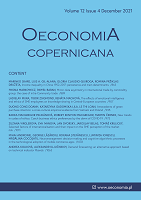Earnings management model for Visegrad Group as an immanent part of creative accounting
Earnings management model for Visegrad Group as an immanent part of creative accounting
Author(s): Mária Kováčová, Lenka Hrosova, Pavol Durana, Jakub HorákSubject(s): Economy, Accounting - Business Administration
Published by: Instytut Badań Gospodarczych
Keywords: creative accounting; central Europe countries; model of creative accounting; regression analysis
Summary/Abstract: Research background: Creative accounting practices do not frequently violate the law and are not considered illegal; however, accounting managers may exploit legal ambiguities to portray the company's financial standing in accordance with management preferences. Therefore, the analysis is focused on the detection of earnings management in companies operating in the Visegrad Group, which represents one of the most commonly used techniques for revealing creative ac-counting. Purpose of the article: The aim of the presented study is to reveal the presence of creative ac-counting through the detection of earnings management in the countries of the Visegrad Group and, based on the detected results, to propose a regression model of earnings management in the Visegrad Group. Methods: To reveal the use of creative accounting in the Visegrad Group, ten selected models of earnings management were applied during the period 2016–2020 to a set of 8,134 companies. The Mann-Whitney test and multiple linear regression were used to verify the existence of earnings management. These findings served as the basis for the creation of the linear regression model of earnings management in the Visegrad Group. Findings & value-added: The presence of earnings management was best captured by the Hribar and Collins model in companies operating in the Visegrad Group in the period 2016–2020. The findings also confirmed that positive discretionary accruals acquired higher values over the entire period when compared to negative discretionary accruals, confirming that companies in the sur-veyed group manage their profits primarily by increasing them. Therefore, we created a regres-sion model, that can serve as a unique basis and is capable of revealing the use of earnings man-agement in the Visegrad Group, as until now nothing like this has been implemented in these countries. In conclusion, this study offers insights for academicians and researchers on creative accounting in the selected period. Lastly, the study contributes to the existing theory by conduct-ing new research on the earnings management determinants of the countries studied.
Journal: Oeconomia Copernicana
- Issue Year: 13/2022
- Issue No: 4
- Page Range: 1143-1176
- Page Count: 34
- Language: English

